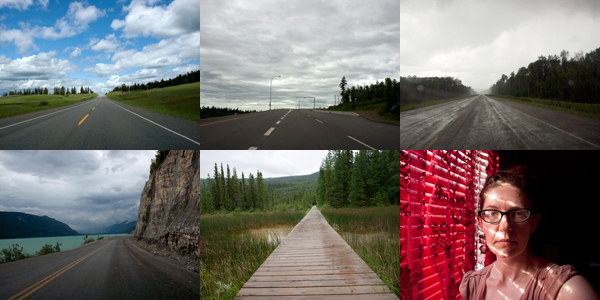6.2011 | Landscape, a tiny car, eyes awake at the horizon

Driving for three days, stopping only for gas and for sleep. Keep forgetting to eat.
In the Yukon now, just barely—Watson Lake. Picked this hotel because of the red curtains in the pictures of the rooms on the website. It is seven-thirty in the morning, and I'm sitting in darkness made by thick blinds closed tight.
Even so, color: White morning light that has breached the blades and bled through the red lace curtains. Light not bound to the window illuminates the pale blue that is actually the color of the wall, and the yellow light of the bathroom emanates softly through a crack in the door. From my vantage, all three in a row, red, blue, and yellow, light and shadow, across the perpendicular planes of the stair-shaped room.
Behind me, inexplicabely, a blue floral wallpaper. It conflicts with the blue floral print of the bed spread, which when turned back reveals red sheets. Strange wood, thick and stained dark, inlaid with mirrors.
I feel melancholy. I take this as a sign of destination. No one can reach me here, and I can't reach out. I want to reach, but this is what I asked for: isolation. I find comfort in the inability rather than having to choose.
What shape will this journey take?
Drove more than six hundred miles yesterday, starting at mile 0 of the Alaska Highway. The road quickly enters the unfathomable wilderness, flanked by a wide easement so you have a chance to see the bear and caribou and foxes and wolves and buffalo before they step onto the road. And there were bear, and buffalo. I did see a fox, a worried-looking wet little thing, pelt a blue-orange.
Hundreds of miles atop a plateau at first. (Is it the plateau that is the landmark, or the other way around?) The short narrow evergreens infinite and eye-wigging. Occasionally, industry. A dirt road. Gas lines—the ones you see from 30,000 feet as you're flying over Canada—sometimes intersect the highway. I thought about the crimes that hide behind the tree line.
The dots might be the same size on the map, but the towns become ever smaller, dirtier. The towns have services, but those are diminutive, too. One-pump towns.
The highway climbed the Rockies and the road became winding and cliffbound. Vast rock fields just bare of snow spilled onto the road, and in river valleys wide and stoney, shimmering tendrils of cyan bright as old copper roofs. Here I saw a herd of buffalo crossing the highway and several bear snacking in the tall grass beside the road.
I stopped at hot springs in Laird River in the pouring rain. The springs were a slow-moving river that had been partially blocked to idle the flow but otherwise left as formed but for some wooden platforms and changing rooms constructed to make it easy for people to enter. It was deep and clear and hot. I forgot a swimsuit so I wore my running outfit. I was hesitant, not sure about the rain, about taking the time to stop, or whether the heat would make me drowsy. But getting out of the car and walking along the boardwalk across a boiling marshland in the utter quiet of the far north made the stop the unexpected highlight of the day. The water mute, steam soft on my cheeks. The rain hard on the earth.
The only paved road in Watson Lake is the highway, and I have the feeling of being in a pioneer town. That sense is more true than it has ever been. The hotel does not disappoint, and in a moment I will set up the camera to take some pictures. The walls are a gesture; there are no secrets here. The door to the room has a lock but it doesn't really lock, so I pushed a chair up on the door knob and put my luggage behind that.
Today I strive for Dawson City. The light no limit.